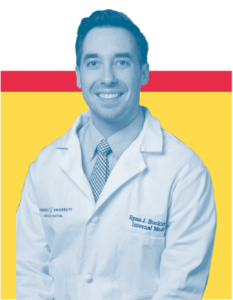Clinical Innovators

Several years ago, Adam Hetzler was working at the Sandia National Laboratories in Albuquerque, New Mexico, when he decided to do something completely different with his life.
“I loved the people I worked with, and I thoroughly enjoyed the work,” he said, “but I wanted to make a more tangible difference in people’s day-to-day lives.”
Hetzler, who has a PhD in nuclear engineering, heard about a program at Vanderbilt for people with doctorates in engineering or the applied sciences who wanted to become both practitioners and “innovators” in the medical field.
The idea of applying his previous training to solve large-scale issues in health care and having the privilege to treat patients was an opportunity that was too good to pass up.
In 2018 Hetzler joined Hunter Sceats, a PhD in extractive metallurgy who had worked for Medtronic for a year, and Emily Thomas, a PhD in biochemistry and cell biology, as the third class in VUMC’s Medical Innovators Development Program.
The MIDP was established in 2015 by Reed Omary, MD, MS, the Carol D. & Henry P. Pendergrass Professor of Radiology and Radiological Sciences and chair of the department, and professor of Biomedical Engineering.
Under current MIDP director Ryan Buckley, MD, assistant professor of Clinical Medicine in the Section of Hospital Medicine, the program now accepts applications from any incoming medical student who is interested in health care innovation.
Vanderbilt medical students bring with them “an unbelievable diversity of impressive creative skillsets and experiences,” Buckley explained. “They’re entrepreneurs, designers, artists, activists, programmers and myriad other things on top of being scientists.
“It’s a dream job to coach these students as they tackle what we call ‘wicked problems’ … that have plagued the health of people, communities and our society for decades,” he said.
During their second-year core clerkships in the MIDP, Hetzler, Sceats and Thomas discussed how they could use their prior expertise to solve current patient-care problems.
One thing they’d observed was a lot of patients with conditions such as heart failure and COPD being readmitted to the hospital within a very short time frame. “We decided to figure out how we could reduce the rate of readmissions,” Hetzler said.
Drawing from their previous experience in artificial intelligence and machine learning, they wrote an algorithm to predict which patient was likely to be readmitted. They called their model “expected value.” By reducing readmissions, “we expected to deliver value to our customers,” he said.
The students validated their model through extensive customer surveys and won three pitch competitions during their fourth year of medical school. They decided to put their entrepreneurial adventures temporarily on hold, however, so they could pursue residency training.
Buckley said he recognizes the challenges students face in launching their ideas while pursuing clinical training. “We hate seeing great ideas get put on a shelf,” he said. “We’re building infrastructure for a succession plan to help their ideas continue to save lives, while they’re off saving lives in residency.”
